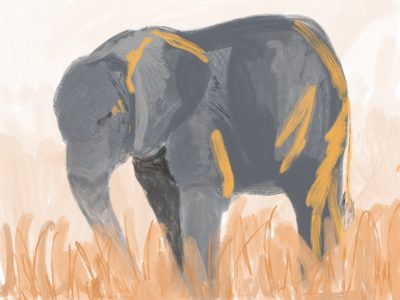Recently, I was reminded of the ivory trade — an issue I had long forgotten about. What had happened to it? I went online to see if there were any recent articles or updates on the topic. Surprisingly, there weren’t any.

I began wondering what happened to the elephants affected by the trade. From what I gathered on the elephant ivory trade — more specifically the African Elephant ivory trade — wholesale prices dropped after China passed laws banning the sale of ivory in 2017.
Then, the news on the matter seems to go blank. What happened after the end of the trade in China?
The African elephant population is still decreasing — from 2007 to 2015, elephant populations in the savannah decreased by 30 percent. Clearly, there’s still a market for ivory, and its sale is happening illegally.
Before I dive in, there are some important things that need to be known.
First, there are a few main producers of ivory besides elephants: narwhals, hippos, walruses and sperm whales.
Second, ivory used to be immensely valuable as a cultural tool, and at one point, it was used for everything from piano keys to pool balls. The demand for ivory used to be very high and, logically, it would be higher now since there is a smaller supply.
Third, with the implementation of the Convention on International Trade in Endangered Species treaty in July of 1975, the ivory trade seems to have stopped.

And yet elephants continue to be poached at an alarming rate, even after the Chinese ban on ivory trade, which was heralded as a major victory for wildlife conservationists.
It doesn’t help that religious artifacts made of ivory fetch enormous sums of money. For others, the rare and exotic nature of ivory makes it all the more appealing.
In the past, there were speculations that terrorist groups use ivory imported from Africa to fund their operations. There is evidence that groups such as al-Shabaab — otherwise known as “the youth” based out of Somalia — served as carriers for the African ivory trade in China.
The history of ivory trade shows the extent of human greed. To kill a defenseless animal for their teeth just to make a quick buck truly shows the lengths humanity will go to for money. Elephants do not infringe upon anyone’s life, but they bear the brunt of our murderous desires.
Human greed will always be a powerful motivator for the purchase of illicit goods, criminal activity and immoral actions.
With the ban on ivory, the poaching of elephants should have stopped. But it didn’t. What does that say about our future?
Ivory poaching is still happening despite all of the bans against it. Reading a National Geographic article on the subject proved just how many ways there are to smuggle ivory around the world.
When I started looking into the trade of elephant ivory, I did not expect to travel into the depths of human depravity. It makes me wonder if any effort toward an ethical, just society will ever be fully successful.
The CITES treaty didn’t work. Forty-six years after the implementation of the ban on ivory, business is still booming. Once again, humans will use any means necessary to plunder the earth for its few natural resources.





Hey Max,
Your article comes at an interesting time for me. I just dived back into some documentaries such as “Garden of Eden”, “Naledi: A Baby Elephant’s Tale”, and “Return to the Forest”. I was wondering the same thing as you…and finding your article as I am searching for it tells me that not much has been done.
Thanks for sharing the same concerns and support toward ending the ivory trade. Let’s not forget to spread the mission and message to end the global ivory trade. If we don’t spread hope, who else will?